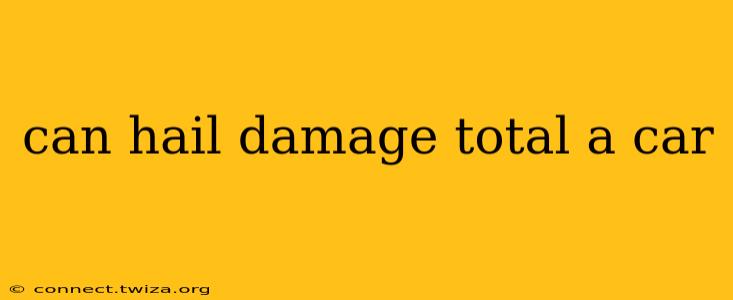Can Hail Damage Total a Car?
Hail damage can absolutely total a car, although it depends on several factors. While a small hail storm might only leave minor dents, a severe hailstorm with large hail stones can cause extensive damage, leading to a total loss declaration by your insurance company. This article will delve into the specifics, answering common questions surrounding hail damage and its impact on vehicle value.
What factors determine if hail damage totals a car?
Several crucial factors influence whether hail damage will total your vehicle. The most important are:
-
Severity of the Hail: The size and weight of the hailstones directly correlate with the extent of the damage. Larger hailstones (larger than 1 inch in diameter) are more likely to cause significant damage to the car's body, windows, and even mechanical components.
-
Extent of the Damage: The number of dents and the area affected play a vital role. Even smaller hail can total a car if the damage is widespread, affecting multiple panels and requiring extensive repairs.
-
Vehicle's Make, Model, and Year: The value of your car before the hail damage significantly impacts whether the repair costs exceed the vehicle's worth. Older cars with lower pre-damage values are more likely to be totaled, even with moderate hail damage. Newer, more expensive cars may require more extensive repairs to be considered a total loss.
-
Repair Costs: The cost to repair the hail damage is the primary factor. Insurance companies compare the estimated repair cost to the vehicle's actual cash value (ACV) before the incident. If the repair cost exceeds a certain percentage of the ACV (typically 70-80%, varying by state and insurance company), the vehicle will likely be declared a total loss.
-
Insurance Company Policies: Each insurance company has its own set of guidelines and thresholds for determining total loss. These policies may slightly vary, affecting the final decision.
How much hail damage is considered total loss?
There's no single answer to this question. The threshold for totaling a vehicle due to hail damage is determined by comparing the cost of repairs to the vehicle's pre-damage value. Generally, if the repair cost surpasses 70-80% of the car's pre-loss value, the insurance company will likely deem it a total loss. However, this percentage can vary based on your insurance provider and local regulations.
What are the signs of total loss hail damage?
Several visible signs indicate that hail damage might total a car:
- Numerous and Deep Dents: A large number of dents across multiple panels are strong indicators of potential total loss. Deep dents that are difficult to remove are particularly concerning.
- Cracked or Shattered Windshields or Windows: Significant damage to the windows significantly increases repair costs.
- Damaged Mechanical Components: If the hail causes damage to the engine, transmission, or other crucial mechanical parts, the vehicle is much more likely to be totaled.
- Extensive Paint Damage: While paint damage can be costly, it's less likely to total a vehicle on its own unless paired with other significant issues.
How is hail damage assessed for insurance claims?
Insurance adjusters will typically conduct a thorough inspection of your vehicle to assess the hail damage. This assessment involves:
- Visual Inspection: A visual examination of the car's exterior to identify the extent and severity of the damage.
- Detailed Documentation: Photographs and detailed notes are taken to record all the damage.
- Repair Estimates: Estimates are obtained from reputable repair shops to determine the cost of repairs.
- Vehicle Appraisal: The insurance company will determine the vehicle's actual cash value (ACV) before the hail damage occurred.
The combination of the repair estimates and the ACV determines whether the vehicle is totaled.
What should I do if my car is totaled by hail?
If your car is declared a total loss due to hail damage, your insurance company will provide you with a settlement based on the vehicle's ACV. You will then need to decide whether to accept the settlement and relinquish ownership of the vehicle, or negotiate with the insurance company if you feel the settlement is unfair.
This information is intended for general knowledge and should not be substituted for professional advice from an insurance agent or auto body repair specialist. Always consult with your insurance provider to understand the specifics of your policy and the claims process.
